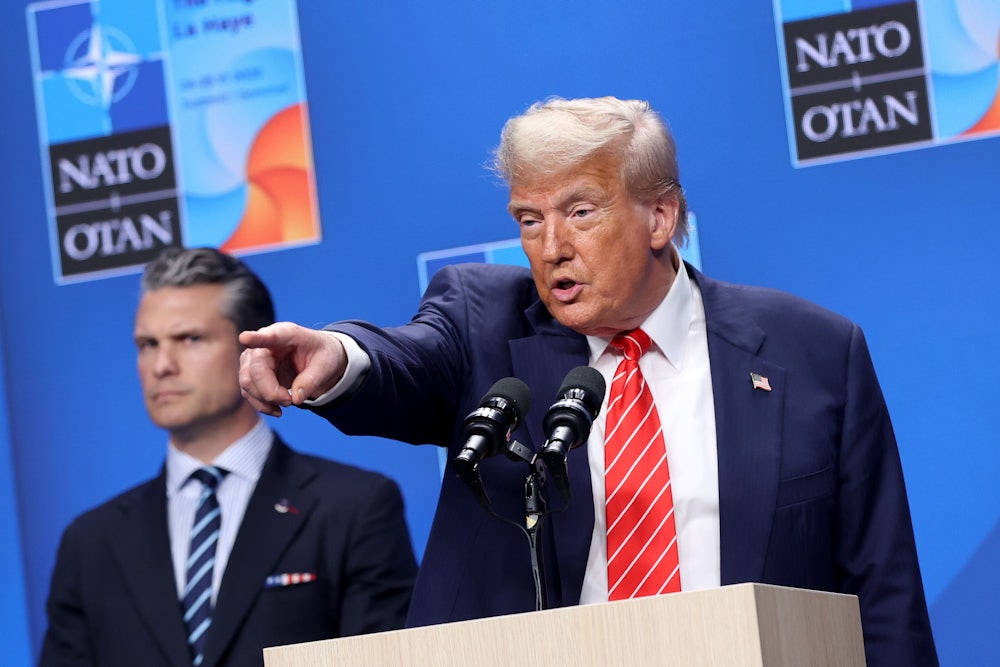President Donald Trump has insisted that the sites in Iran targeted by American airstrikes last week have been “obliterated,” decimating its nuclear program—a claim that has been backed up by key administration officials despite an initial intelligence report finding that the damage was more moderate. But alongside the question of whether significant damage has been done to Iran’s nuclear ambitions, there is another thorny issue that lawmakers must now address: the legality of Trump’s decision to authorize the strikes in the first place.
“It’s not just a matter of statutory interpretation, it’s a matter of [the] Constitution requiring that Congress be the one to play a critical role in making a decision and using force,” said Oona Hathaway, professor of international law at Yale Law School. “For the president to make that decision unilaterally, without going to the Security Council, without going to Congress, and putting U.S. troops and allies at risk is really extraordinary and clearly unlawful.”
The president’s power to use military force is constrained by the U.S. Constitution, the United Nations Charter, and the War Powers Resolution of 1973. According to Article 1 of the Constitution, only Congress has the authority to declare war, although it has not done so since World War II.
The War Powers Resolution was enacted in response to the Vietnam War as an attempt to counter presidents’ approval of military action without the consent of Congress. It was pushed through over President Richard Nixon’s veto. The law requires that a president consult with Congress before engaging military forces, and report within 48 hours why the action was taken, under what authority, and “the estimated scope and duration of the hostilities or involvement.” It also says a president must terminate the use of military force within 60 days if he has not sought approval from Congress.
Despite its intention to ensure a conflict such as the Vietnam War never occurred without congressional consent again, the War Powers Resolution has often been ignored by the White House. For decades, presidents have pushed the limits of their power to engage in conflicts, while Congress has continued to take the back seat in enforcing its constitutional authority to declare war. Several presidents have taken military action without following the letter of the War Powers Resolution, including President Bill Clinton ordering airstrikes in Kosovo and President Barack Obama authorizing intervention in Libya.
But Michael Glennon, professor of constitutional and international law at the Fletcher School of Law and Diplomacy at Tufts University, argued Trump’s actions were unique in that “the risks entailed in this particular action are orders of magnitude greater than any of the supposed recent precedents.” He cited the threat of retaliation to the tens of thousands of U.S. troops posted around the Middle East, as well as “stoking long-term regional animosities” and “degrading the American reputation in diplomatic dealings with other countries.”
“In none of these recent cases was the context the same—the context being the exposure of the United States to a level of risk and cost that has not occurred before,” Glennon said.
Trump’s actions do follow a pattern of presidential engagement in conflict being followed by congressional dithering. Over several decades, presidents have learned that there will be little consequence for ignoring the War Powers Resolution. Hathaway said that cases challenging a president’s actions do not typically go to court due to lack of legal standing.
“I don’t think that that should lead us to think that there is no relevant law here, that this is a law-free zone where the president can do whatever he wants because he knows no one can actually enforce the rules,” said Hathaway. “If the fact that there may not be consequences means that there’s no law, then we’ve really got a problem on our hands.”
Any pushback to unilateral presidential action may come from public disapproval of extended conflict rather than direct congressional action. A new Quinnipiac poll shows that the public is largely reacting to Trump’s strikes in Iran with disapproval, although Republicans remain on board with the president’s actions.
“Ultimately, Congress has not, in a significant way, constrained presidents from acting in these cases,” said Jordan Tama, professor in the Department of Foreign Policy and Global Security at American University’s School of International Service. “The members of Congress who have been most concerned about violations of the War Powers Resolution, or presidential actions that are not authorized by Congress … have not been able to muster the majority you need in Congress to pass new binding legislation that explicitly prohibits the president from pursuing military action.”
Trump’s actions in Iran have been met with some pushback from lawmakers, particularly after a scheduled briefing by administration officials for lawmakers was postponed this week. Axios further reported that the White House is limiting the sharing of classified information with Congress. Democratic Senator Tim Kaine is leading a resolution that would require Trump to seek congressional approval before engaging in further military hostilities in Iran, with an added amendment intended to alleviate concerns that it might hamper American support for Israel’s activities in the region. Although the Senate is set to vote on the measure on Friday evening, it’s unclear whether it would garner any Republican support in the upper chamber.
Moreover, GOP Representative Thomas Massie, the Republican co-sponsor of a parallel measure in the House, said that a vote on his bipartisan resolution might be made moot if the ceasefire between Iran and Israel holds. Even if either of these measures makes it to the floor, however, it’s unclear how much bipartisan support they would receive.
Indeed, there is little political will to repudiate the president, and even if there was, lawmakers would need to marshal a veto-proof majority to take concrete action. Overturning a presidential veto would require support from two-thirds of members, which is unlikely in a Republican-majority Congress. In 2019, Congress approved a measure that would have pulled American support for Saudi Arabia’s conflict in Yemen, but that resolution was vetoed by Trump. This puts Congress in a “terrible fix,” said Hathaway: Rather than the president going to Congress to authorize military action, Congress must take the initiative to repudiate it.
“We end up with this learned helplessness in the sense that Congress chooses to stop trying, because what’s the point?” said Hathaway. “The president has learned that [he] can use military force without seeking authorities from Congress without consequence.”
Aside from a seeming unwillingness to counter smaller-scale military engagements by presidents, Congress has similarly struggled to repeal or update authorizations for the use of military force in Iraq and Afghanistan approved ahead of the Gulf War and after the 9/11 terrorist attacks. The 2001 authorization, which applied to perpetrators of the 9/11 attacks, has been treated by presidents as an umbrella approval to strike at other organizations affiliated with Al Qaeda. Efforts to overturn or narrow these authorizations have floundered in recent years, even decades after they were approved.
Countering the president invites risk for members of Congress. For Republicans, resistance to the president’s aims will only court Trump’s retaliation. More generally, however, lawmakers take the view that authorizing the commencement of military engagements—or ordering them to cease—comes with unintended political consequences. Voting in favor of the 2003 authorization of military force in Iraq became a major political albatross for Democratic primary candidates in the 2008 presidential election. That said, repealing such an authorization invites blowback, as well, if, for example, the move to do away with such a law was followed by a terrorist attack on American soil, or U.S. interests getting threatened abroad. The status quo has a latent appeal to lawmakers, who get to offset the political risk of military intervention while maintaining the ability to criticize it—or take credit.
“Casting a dangerous vote on an issue of war and peace is a perilous political act, and they would prefer to avoid that, because they would prefer their careers be extended and not hindered,” said Glennon.










